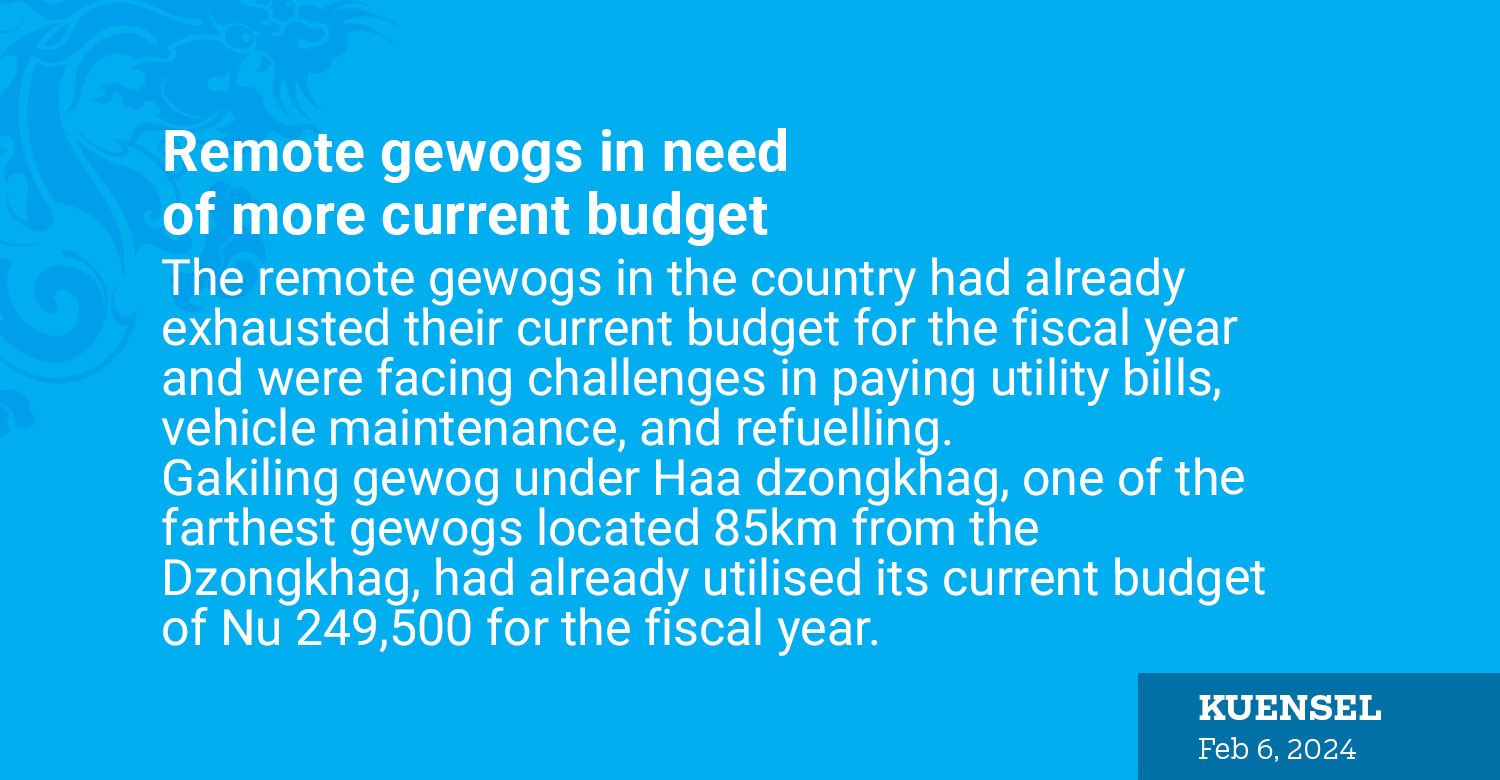Dechen Dolkar
The remote gewogs in the country had already exhausted their current budget for the fiscal year and were facing challenges in paying utility bills, vehicle maintenance, and refuelling.
Gakiling gewog under Haa dzongkhag, one of the farthest gewogs located 85km from the Dzongkhag, had already utilised its current budget of Nu 249,500 for the fiscal year.
Gup Wang Tshering said Gakiling gewog, being the farthest, received the lowest current budget among the six gewogs in the dzongkhag for in-country travel, vehicle maintenance, and fuel in the current fiscal year.
During each fiscal year, the Ministry of Finance allocates Nu 115,000 to all the 205 gewogs for maintenance and fuel. Additionally, the ministry allocated a similar amount of the current budget for paying utility bills, equipment maintenance, building maintenance, and computer expenses. The only variable factor was in the allocation of Travel Allowances and Daily Allowances (TA/DA) funds outside gewogs, which was determined by the distance of each gewog from the dzongkhag and drungkhag.
The Gakaling gewog received Nu 118,000 for the in-country travel for the current fiscal year.
Gup Wang Tshering had appealed to the dzongkhag office, who in turn had written to the Ministry of Finance requesting for an additional budget. However, the ministry had responded, stating that the budget was calculated using a formula based on the gewog’s distance from the dzongkhag and drungkhag.
The gewog mostly dealt with the dzongkhag for its works, even though the drungkhag was nearby. The drungkhag office catered mainly to land and engineering services.
The gewog had now reappropriated the budget for necessary expenditures such as fuelling the vehicle and to pay utility bills.
The gewogs provided essential services like transportation for civil servants on duty, official chiwogs visits, national programs like election duty and tree planting initiatives, and facilitating health officials’ monthly visits to ORC. The vehicle was also crucial for transporting patients to hospitals and the deceased to the crematorium.
The gup said the gewog was planning to carry over the cost of maintenance of vehicles for next fiscal year, as the budget for the maintenance had already been utilised.
However, the budget for travel allowance and daily allowance could not be carried over, leading to officials being unable to move around and often forgoing the allowances when attending meetings in the dzongkhags.
Dumtoe Gup in Samtse, Durga Das, said that his gewog had nearly spent all of the current budget before the fiscal year’s end. To meet necessary expenditures, they have had to reappropriate the budget and occasionally use funds from personal accounts.
Dophuchen Gup, Phuntso mentioned that frequent maintenance is required for the gewog’s old vehicle.
He said that being the largest and farthest gewog, it consumed more fuel when attending important meetings. By January, the budget for fuel and maintenance was exhausted.
“To attend crucial meetings, the gewog resorts to using funds from personal accounts, leading to situations where important meetings are missed due to budget constraints,” the Gup said.
Several gewogs have either finished their current budget or are on the verge of depletion before the fiscal year concludes.
Whereas, some gups mentioned that gewogs near dzongkhags struggle to use the capital budget.
They urged the ministry to allocate a budget for fuel and vehicle maintenance based on the distance from dzongkhags.


